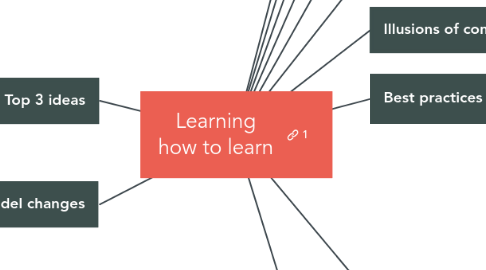
1. Top 3 ideas
1.1. 1. Motivation is most important: understand why you need what you are trying to learn. It's pointless to learn what you will not be using (and you'll just forget it in a while)
1.2. 2. For all meaningful things, you need to invest a meaningful time
1.3. 3. My passions can broaden, change and grow.
2. My operational model changes
2.1. Take breaks: 100% in focused mode is pointless, breaks are not only useful, but are necessary
2.2. Regularity over cramming: you won't have a lasting result from one-time read, quick advice, a list of "10 most important ideas from a billionaire", etc.
2.3. How to beat procrastination: just start and focus on the first step, e.g. process vs product. When performing mental work, focus on just doing it, not the final result (but the final result has to be at least stated)
2.4. How to beat procrastination: understand triggers, avoid those from happening (mobile notifications, quite room, put phone away, etc).
2.5. Health is top priority: exercise, sleep, good nutrition, no alcohool, no smoking
2.6. Regular check in with subconsious by daydreaming: set a timer for 15 min and go to sleep
2.7. Start a notebook "things I would like to learn, skills I would like to have"
2.8. Spaced repetition
2.9. Deliberate practice: test yourself on where it hurts the most
2.10. Interleaving
2.11. Test yourself
2.12. Recall
2.13. Metaphors, analogies & stories
2.14. Use of pomodoro while doing mental work
3. Interleaving
4. Write to-do lists: quitting time is enourmously important
5. Two modes of thinking
5.1. Focused mode
5.1.1. Working from prior knowledge
5.1.2. Familiar thought pattern
5.1.3. Existing and often used neural connections
5.1.4. Associated with problem-solving on familiar tasks
5.2. Diffuse mode = daydreaming
5.2.1. New neural connections are formed in an unpredictable way
5.2.2. Associated with creative way of problem-solving in new ways
5.2.3. Let your mind go free just vaguely thinking of the problem you'd like to come up with a solution for
5.2.4. Dali and Edison used the diffuse mode thinking in order to enter into creative mode of thinking
5.2.5. State where creativity flows
5.3. Important
5.3.1. You have to alternate between modes of thinking in order to learn effectively
5.3.2. This is similar to building muscels, just in this case you build a neural structure instead of muscular structure
5.3.3. Switching between the modes lets literraly to form new neural connection in the brain
5.3.4. How learning happens: a bit by bit activity, cramming doesn't build solid neural structures
5.3.5. Most of "heavy lifting" in terms of brain activity is done below our level of consciousness
5.3.6. You go to sleep with one brain and wake up with another (new sinapces have formed) - this is a brain "upgrade", a better deal then with Microsoft
6. Two types of memory
6.1. Working memory
6.1.1. Is about what you process at this very moment
6.1.2. Can hold from 4 to 9 chunks of information
6.1.3. Being smarter often equals to having more slots of working memory
6.2. Long term memory
6.2.1. There is only meaning in learning things that you will use during your life, because of not used the neural connections will weaken and you will not be able to recall the information
6.3. Additional tricks
6.3.1. Our visual system is enourmously powerful, it's evolutionary
6.3.2. New experiences => new memories => new representation of self
7. Beating procrastination
7.1. Use pomodoro technique
7.2. Recognize how the procrastination works in action (just a habit)
7.2.1. Cue (trigger)
7.2.2. Routine
7.2.3. Reward
7.2.4. Belief
7.3. Process vs Product
7.4. Summing up
7.4.1. Keep a planner journal
7.4.2. Commit yourself to certain routines and tasks each day
7.4.3. Delay rewards until you finish the task
7.4.4. Watch for procrastination cues
7.4.5. Gain trust in your new system
7.4.6. Have backup plans for when you still procrastinate
7.4.7. Eat your frots first
7.5. Additional materials
7.5.1. Procratination equation by Alex Vermeer
7.5.2. How to beat procractination by Tim Urban
8. Chunking
8.1. Pieces of information bound together trough meaning or use
8.2. Formation
8.2.1. Focused "undivided" attention
8.2.2. Understand the basic idea (connection between the basic elements of the chunk constituents)
8.2.3. See the context (how the chunks fits in a bigger picture)
8.2.4. Practice
8.3. Important
8.3.1. Brains are naturally less disposed to comprehend and learn abstract ideas (math is a good example)
8.3.2. You have to create libraries of chunks - programs that you operate in real world
8.3.3. Transfer
9. Illusions of competence
9.1. Looking at the solution and saying "I know why they are doing what's written in the text-book)
9.2. Highlighting too much
9.3. Overlearning
9.4. Forming chunks without proper understanding
9.5. Rereading
9.6. Multi-tasking
10. Best practices
10.1. Practice makes permanent
10.2. Spaced repetition (hello, Anki!)
10.3. Bulding strong neural structures: regularity over quantity
10.4. Sleep right
10.5. Learning by doing
10.6. Learning by osmosis from people who are experts
10.7. Test yourself
10.8. Being in rich intellectually environment is very important, especially in old age
10.9. Exercise fosters new neurons to be born
10.10. Sucsses isn't necessarily about being smart, it's more about being passionate and persistent
10.11. Motivation
10.11.1. A big part of the brain is constantly processing not the content of a particular experience, but its importance and value to your future
10.11.2. Acetylcholine
10.11.2.1. Responsible for focused learning and attention
10.11.3. Dopamine
10.11.3.1. Responsible for reward mechanisms
10.11.4. Serotonine
10.11.4.1. Responsible for social activity
10.12. Deliberate practice
10.13. Einstellung
10.14. Being passionate about a subject is often a matter of how much you were exposed to this subject
10.15. Minimize the probability of distructions
10.16. Sets are difficulst to memorise => create meaningful groups
10.16.1. Numbers linked to smth
10.16.2. First letters of words
